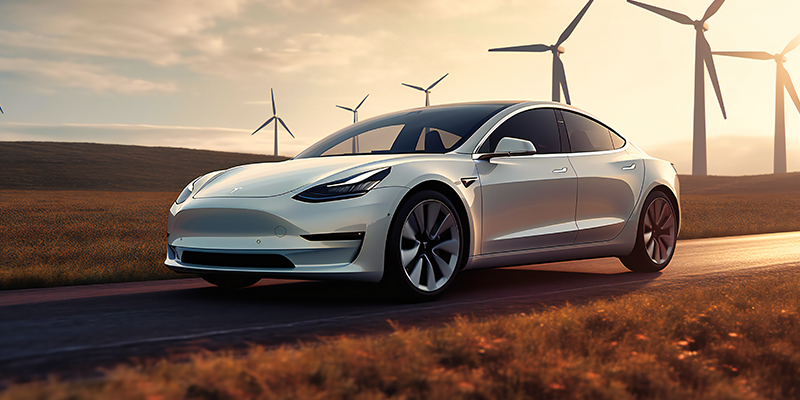Top 10 Electric Car (EV) Questions Answered
Top 10 Electric Car (EV) Questions Answered

Whether you want it or not, times are changing, and the 2035 changeover will be here before you know it. Soon petrol and diesel cars will be left in the past. For a lot of people Electric Vehicles (EVs) are still a thing of mystery, which is why we’re here to answer the top 10 questions surrounding EVs below.
What’s the difference between an electric car and a hybrid car?
Electric cars, are powered purely by electricity, storing energy in a battery and using electric motors to drive the wheels. Whilst hybrid cars, combine an internal combustion engine (that requires petrol or diesel to run) with an electric motor. Hybrids can operate on petrol/diesel, electricity, or both.
Plug-in hybrids are also becoming increasingly popular, which require plug-in charging instead of recharging their motors through regenerative braking like other hybrids. Plug-in hybrids are typically lower emission than other hybrids.
How can I charge an electric car?
The most convenient way to charge your car is at home. You can charge at home using a standard electrical outlet or install a dedicated home charger like Pod Point for faster charging. There are grants available to help save money when installing a charger at your home. The main drawback is you must have space on your property for the car and charger. Also remember, charging cables cannot run across public land.
The other option is to use public charging points. Public charging stations and fast-charging stations are available, offering various power levels for on-the-go charging. These charging stations are popping up all over the UK, and they’re very convenient for keeping topped up when out and about.
There are quite a few apps which can also tell you the location of these chargers, so you can plan your longer journeys accordingly.
Are electric cars expensive to run?
Electric cars are generally more cost-effective to run than petrol or diesel cars. Electricity is less expensive than petrol and diesel per mile, and EVs have fewer moving parts, reducing maintenance costs.
Because electric vehicles run on electricity, you need to keep your electricity costs as low as possible, so always ensure you are on the best EV tariff for your needs.
A big saving point for electric cars is emission zone charges such as ULEZ, road tax (until 1st April 2025), and generally require less servicing due to having fewer parts.
Electric cars are generally more expensive to buy, however the long-term benefits will help to alleviate this cost.
Can you drive and charge an electric car in the rain?
Yes, you can safely drive and charge an electric car in the rain. Electric cars are designed to be weather-resistant, and modern charging stations are equipped to handle wet conditions, ensuring safe operation.
However, no matter what car you have, electric or not, it’s never a good idea to drive through a flooded area.
How long does it take to charge an electric car?

Charging times vary based on the charger type and the EV's battery capacity. Standard home charging may take several hours, while fast-charging stations can provide a substantial range in under an hour.
What is the range of an EV?

The range of an electric car varies by make and model. While some EVs offer ranges as low as 100 miles on a full charge, others can provide over 300 miles of driving before requiring a recharge. It’s also important to remember that range is influenced by many different factors like battery capacity and driving style.
Most modern EVs will allow you to comfortably go about your daily journeys, allowing you to charge your car at home or work. However, for longer journeys it’s best to top up on the way.
Do electric cars break down more?
Electric cars have fewer moving parts compared to traditional petrol and diesel cars, which typically results in fewer breakdowns. The mains areas to keep an eye on with an electric car are its motor and battery.
And with how quickly electric vehicles are advancing, these components are likely to continue to improve over the next few years.
Can you buy or sell second-hand electric cars?
Of course, you can buy and sell a second-hand electric car just as you would any other type of vehicle.
The main thing to look out for when buying a second-hand electric car is checking how well the battery keeps charge and the warranty on it. Also remember to ensure everything else functions as it should, however it is still best to get everything checked over by a professional.
What are the downsides of electric cars?
Whilst electric cars offer many advantages, there are some potential drawbacks to consider. These include limited charging infrastructure in certain areas, longer ‘refuelling’ times compared to petrol or diesel vehicles, and the initial higher purchase cost due to battery technology.
However most brands are now offering EVs for under £30,000, and with some EV grants available, you can save some extra money off the listing prices.
So, Is it worth buying an electric car in 2023?
Absolutely. Now is an excellent time to consider purchasing an electric car. The technology is continually advancing, charging infrastructure is expanding, and the environmental benefits are becoming increasingly apparent.
Lease an electric car with us, get your quote today.
